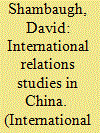| Srl | Item |
| 1 |
ID:
106460


|
|
|
|
|
| Publication |
2011.
|
| Summary/Abstract |
International relations (IR) studies in China have developed considerably over the past three decades. The field is now well established with 49 degree-granting institutions, as well as a series of 'think tanks' that produce policy-related analyses of international issues. Recent survey research of publication trends in the field reveals a significant new diversity of research subject areas, with an increased emphasis on topics associated with Western 'liberal' IR theory and international political economy, while at the same time revealing a tenacity of 'realist' topics such as major power relations. While the quantitative dimensions of the field have grown dramatically - institutions, faculty, publications - the overall quality of research remains very uneven across China and generally weak when compared internationally. This article surveys the historical development of the field, summarizes the current state of the field, and identifies challenges and opportunities for future development.
|
|
|
|
|
|
|
|
|
|
|
|
|
|
|
|
| 2 |
ID:
186291


|
|
|
|
|
| Summary/Abstract |
Social theories of International Relations (IR) are normally premised on a deep distinction between public and private spheres. Whether articulated as ‘capitalism’, ‘the market’, or ‘civil society’, all attribute some analytical priority to the private, with explanatory significance for the public sphere and therefore also central to the critique of realism in International Relations. Liberalism in particular sees the source of peace as a flourishing private sphere that narrows the scope of the otherwise violent, war-prone orientation of the public which defines states. However, we argue that this orientation is ill-equipped to grapple with the world-historical significance of the ‘Rise of China’ that is better understood instead as a form of industrialism not premised on the public/private distinction. This inapplicability of categories foundational to liberal IR theory leaves it unable to meaningfully engage the Rise of China debate. Using Uneven and Combined Development (U&CD), this paper elaborates industrialism as a pattern of state-led development in China that prioritises industrial capacity as an end over strictly private objectives (e.g. profits). Arising in substantial part from the exigencies of political multiplicity, industrialism seeks national unity and vindication of a distinct civilisational identity through the pragmatic means of industrial capacity under conditions of modernity. Whilst this argument partly echoes the developmental state literature, it goes further by visualising this across both the longue durée and the current conjuncture, right up to the much-discussed Belt and Road Initiative. Finally, the argument emphasises U&CD’s potential to originate a simultaneously non-liberal and non-realist account of the implications of China’s rise.
|
|
|
|
|
|
|
|
|
|
|
|
|
|
|
|